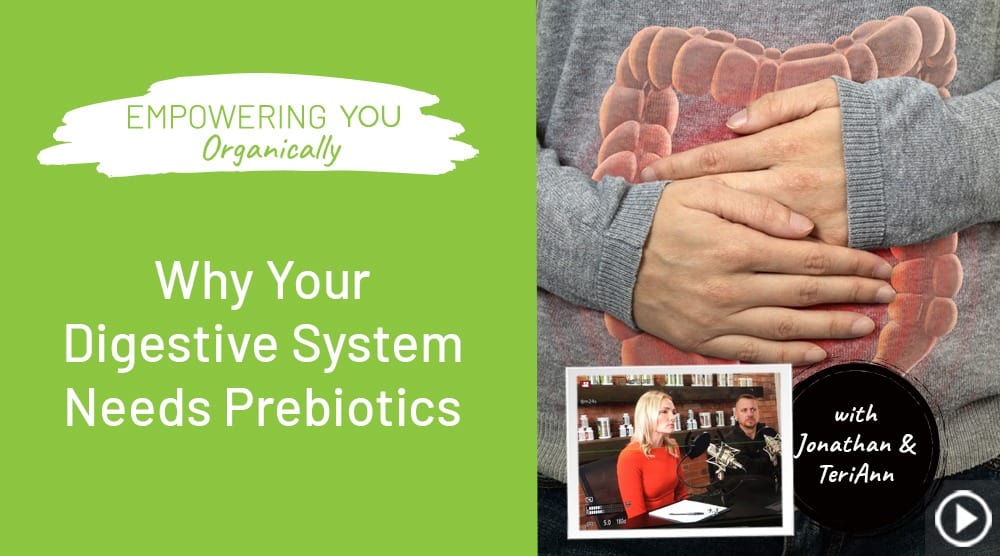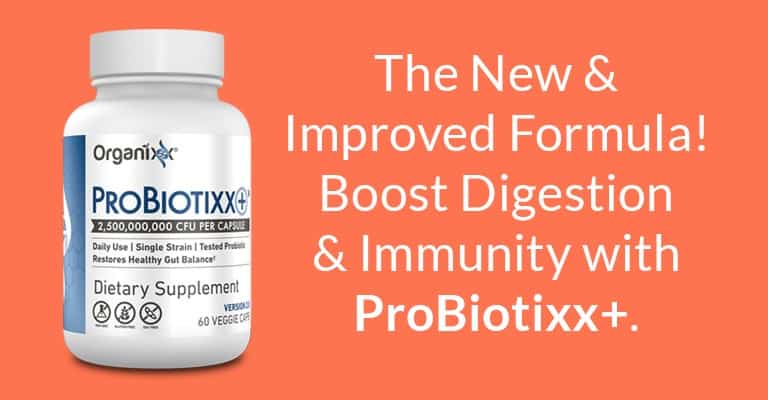Empowering You Organically – Season 12 – Episode 104
Title: Why Your Digestive System Needs Prebiotics
Hosts: Jonathan Hunsaker, TeriAnn Trevenen
Description: Experts and other medical specialists provide evidence showing that prebiotics and probiotics are partners in improving our digestive health. Although probiotics and prebiotics both promote better digestive health, there are some differences between the two like how they work and their specific role in the digestive system. Tune in to learn more…
* * *
FEATURED PRODUCT
- Single super-strain of Lactobacillus plantarum OM
- Doubles every 20 minutes once it makes contact with the foods in your stomach
- Creates a strong, healthy gut barrier to support the flow of nutrients into your bloodstream
- Eliminates bad bacteria while breaking down carbs and protein for less gas, cramps, and bloating
- Supports and protects your immune system
- Shelf-stable plant probiotics; no dairy and no refrigeration required
Our digestive system is responsible for breaking down nutrients from food consumed for growth, cell repair, and energy. Since digestive health is very important, individuals must take note of the ways on how to keep their digestive system as healthy as always.
Experts and other medical specialist provide evidence showing that prebiotics and probiotics are partners in improving our digestive health. Although probiotics and prebiotics both promote better digestive health, there are some differences between the two like how they work and their specific role in the digestive system.
LET US TALK ABOUT PREBIOTICS.
Prebiotics are a special type of carbohydrates found in foods and supplements. These naturally feed the good bacteria inside your gut like Bifidobacterium and lactobacilli. Its main role is to feed the good bacteria in your gut and avoid feeding the bad bacteria such as the pathogens. Good bacteria inside your gut plays a very vital role in the improvement of your immune system and keeping the overall digestive system healthy.
Prebiotics are resistant to acids, body enzymes and heat. They are not destroyed or absorbed the moment they travel into your digestive system. Once they reached the colon intact, they will feed the good bacteria which makes them grow and multiply. We already know that vegetables and fruits are rich in Prebiotics. Here is a list of foods with prebiotics:
- Banana
- Peas
- Beans
- Cherries
- Oats
- Raw onions
- Garlic
- Leeks
- Fresh herbs
- Eggplant
- Asparagus
- Kiwi
BENEFITS OF PREBIOTICS
We tend to ignore prebiotics and we focus on probiotics as the most effective agent in promoting digestive health. If you opt to have a higher intake of prebiotics you can reap the benefits which include:
IMPROVEMENT OF DIGESTION
Prebiotics help in the stimulation of the growth of the good bacteria in your gut. Since this Prebiotics act as food for the probiotics, they help balance all the harmful toxins and bacteria living your digestive tract. Prebiotics also make it possible for you to have great digestion. Studies show that higher intake of prebiotics increases the probiotic organisms such as lactobacillus and bifidobacteria
ENHANCES IMMUNE SYSTEM FUNCTION
Dietary consumption of prebiotics help improves the immune system. Prebiotics also improves the stool quality as well as reduces the risk of many infections and gastroenteritis. Prebiotics boost immunity because they enhance the ability of digestive system to absorb all the important nutrients from the food we eat.
Another help of prebiotic is its ability to lower the pH level in the gut.
LOWER INFLAMMATION
Inflammation is one of the main causes of disease such as heart disease. Luckily, prebiotics can lower the inflammation. It is also believed that prebiotics contributes to the improvement of our metabolism. This also helps the body for better absorption of nutrients entering your body.
REDUCE RISK OF HEART DISEASE
Eating foods that are high in prebiotics can help your body reduce glycation which is the primary cause of trigger inflammation. This also lowers your body’s insulin resistance.
HERE ARE OTHER BENEFICIAL EFFECTS OF PREBIOTICS INTO OUR BODIES.
- better gut health
- the lower stress response
- higher immune system
- lower risk of weight gain and obesity
- better hormonal balance
- healthy cholesterol level
Recent studies also show the significant effect of prebiotics on the human’s digestive system. Eating foods that are rich in prebiotics can help you have better health results especially in your digestive system.
HEALTH COACH TIP
- Please note many with SIBO cannot handle a prebiotic and do better consuming them in food form.
* * *
Subscribe to Empowering You Organically
Never miss an episode!
APPLE PODCASTS SPOTIFY GOOGLE PODCASTS






